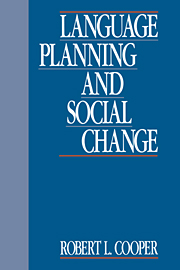Book contents
5 - Status planning
Published online by Cambridge University Press: 06 January 2010
Summary
Just as languages change over time, the functions they serve for particular communities change as well. Familiar examples include the shift in Western Europe from Latin to modern European languages for literary and scholarly purposes, the shift in England from Norman French to English for use in courts of law, and the shift in Indonesia from Dutch to Bahasa Indonesia as the language of government administration. The most spectacular changes of all are shifts in a community's mother tongue, as, for example, the adoption of Arabic as the language of the home throughout most of North African and Middle Eastern territories conquered by the armies of Islam.
Perhaps most of the changes which occur in the functional allocation of a community's languages are spontaneous. Some, however, are the outcomes of planning. For example, the spread of Kiswahili for economic functions in Eastern Africa was the unpremeditated result of expanded trade within a linguistically diverse region. In contrast, the spread of that language for political, educational, and religious functions was the result of deliberate policy (Mazrui and Zirimu 1978). Status planning refers to deliberate efforts to influence the allocation of functions among a community's languages.
Stewart's functions as targets of status planning
What functions serve as targets of status planning? A well-known list of language functions is the one which Stewart (1968) provides in his discussion of national multilingualism. Let us look at each of the functions which he mentions, beginning in each case with his description of the function.
- Type
- Chapter
- Information
- Language Planning and Social Change , pp. 99 - 121Publisher: Cambridge University PressPrint publication year: 1990



